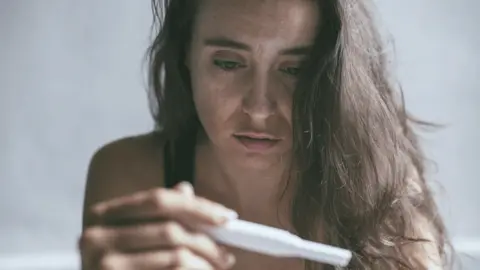Women 'need to know egg freezing risk'
Women who freeze their eggs need to be aware of the "relatively low success rates" of becoming pregnant, a leading gynaecologist has said.
With more women freezing eggs past the age of 35, when chances of conceiving fall, Prof Adam Balen said: "Egg freezing does not guarantee a baby."
However, Dr Jara Ben Nagi says freezing can help single women wait until they meet the right partner to have a baby.
She said women should not be pressured into a relationship to get pregnant.
Two groups of experts have been debating the benefits and risks associated with social egg freezing and IVF treatment for women in their late 30s in BJOG: An International Journal Of Obstetrics And Gynaecology.
'Punished with childlessness'
Prof Balen, of the Royal College of Obstetricians and Gynaecologists, said: "Success rates for egg freezing have improved significantly in recent years, so offer an opportunity for women to freeze their eggs for social reasons if they're not ready to have children yet.
"While women should be supported in their choices, they must be informed about the relatively low success rates, high costs and side-effects.
"Women should also be aware that in the UK the storage limit for eggs frozen for social reasons is currently limited to 10 years."
He warned that women should speak to a reproductive specialist and choose an experienced clinic to visit, adding that the best time to freeze eggs is in a woman's early 20s and certainly under the age of 37.
However, Dr Ben Nagi, from the Centre for Reproductive and Genetic Health, and her colleagues argue that the preservation of eggs offers more time for single women to find a relationship and gives them hope at a time that their pregnancy chances may be receding.
They point out that in a study of 1,382 women who underwent social egg freezing, 120 returned to use their eggs after an average time of just over two years and that 45 of 95 women who were single at the time came back when they had a partner.
They add that the survival rate of the frozen egg using the new vitrification method was 85%, with pregnancy rates of 27% - similar to a 23% success rate for IVF in women aged 35 to 37.
They said: "Women should no longer be punished with childlessness for not finding a partner, nor should they feel pressured into a relationship because of their declining ovarian reserve."
 Getty Images
Getty ImagesDr Timothy Bracewell-Milnes, from Imperial College London, and co-authors from Chelsea and Westminster Hospital in London, warn that the majority of women are taking measures to preserve their fertility too late.
They said it is being done as a "last-ditch effort" instead of a planned and informed choice in their early to mid-30s.
They said research has shown young people are not aware of the natural limits of female fertility and "significantly overestimate" the success rates of freezing eggs to get pregnant later.
"Egg freezing is indirectly encouraging women to have children at an advanced maternal age, which carries with it significantly increased risk of medical complications in pregnancy," the authors said.
For women in their late 30s, they said 30 eggs would be needed to have a good chance of getting pregnant.
This would require three cycles of ovarian stimulation which would cost around £15,000. On top of this there will be an annual storage fee of £200-400 and the cost of future fertility treatment to use the frozen eggs.
They agree egg freezing should be available to single women in their late 30s "who accept the high costs and low successes, but they must be provided with accurate and balanced information on the safety and likelihood of success".
But they do agree that women need to be made aware of all the information to make an informed choice.
